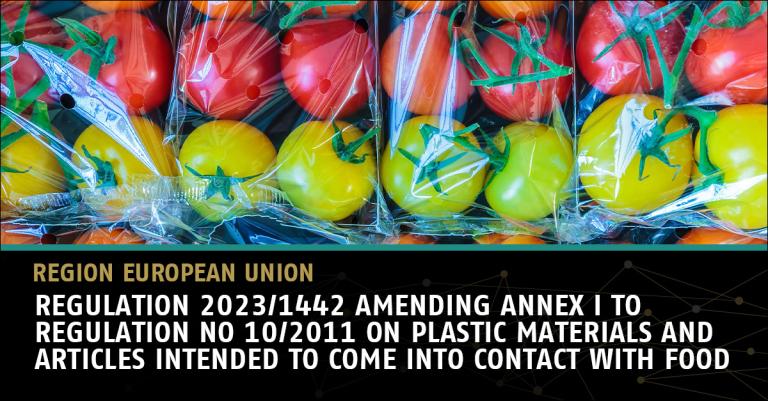Regulation 2023/1442 amending Annex I to Regulation (EU) No 10/2011 on plastic materials and articles intended to come into contact with food
On July 11th, 2023, the European Commission adopted Regulation 2023/1442 amending Annex I to Regulation (EU) No 10/2011 on plastic materials and articles intended to come into contact with food. The changes include revisions to substance authorisations and the addition of new substances. These amendments will be in force beginning 1 August 2023.
- New limits for phthalates: individual SMLs have been modified and a new total specific migration limit (SML(T)) for the sum of phthalic acid, dibutyl ester (DBP), diisobutyl phthalate (DIBP), phthalic acid, benzyl butyl ester (BBP) and phthalic acid, bis(2-ethylhexyl) ester (DEHP) expressed as DEHP equivalents has been established;
- Revocation of the authorisations for the substances ‘wood flour and fibers, untreated’ (FCM No 96) and salicylic acid (FCM No 121); Plastic materials and articles manufactured with salicylic acid (FCM No 121) or with untreated wood flour or fibres from a specific wood species may continue to be placed on the market after 1 February 2025 provided that particular conditions are fulfilled (please contact knoell FFCM team for more details);
- Extension of the existing authorisation for the use level of the substance diethyl[[3,5-bis(1,1-dimethylethyl)-4-hydroxyphenyl]methyl] phosphonate (FCM No 1007) also to the manufacture of poly(ethylene 2,5-furandicarboxylate) (PEF);
- Modification of Poly((R)-3-hydroxybutyrate-co-(R)-3-hydroxyhexanoate) (PHBH) restrictions and specifications;
- Extension of the use of Phosphorous acid, triphenyl ester, polymer with alpha- hydro-omega- hydroxypoly[oxy (methyl-1,2-ethanediyl)], C10-16 alkyl esters as an additive in acrylonitrile-butadiene- styrene (ABS) materials
- New Food Contact Materials(FCM): 1078 tris(2-ethylhexyl) benzene-1,2,4-tricarboxylate; 1080 (triethanolamine- perchlorate, sodium salt) dimer; 1081 N, N-bis (2-hydroxyethyl) stearylamine partially esterified with saturated C16/C18 fatty acids; 1082 Phosphoric acid, mixed esters with 2-hydroxyethyl methacrylate; 1083 Benzophenone-3,3',4,4'- tetracarboxylic dianhydride (‘BTDA’);
In order to allow operators to adapt to the changes, plastic FCM and articles complying with Regulation (EU) No 10/2011 are allowed to continue to be placed on the market for a transition period until the 1st of February 2025, 18 months after the entry into force of this Regulation. These materials placed on the market prior to the 1st of February 2025 may remain on the market until the exhaustion of stocks. For the sake of consumer safety, operators manufacturing intermediate products and substances that do not yet comply with this Regulation are required to inform the users of these products by 1 May 2024, nine months following the entry into force of this Regulation, that their products, as provided, cannot be used to manufacture plastic materials and articles to be placed on the market after the transition period of 18 months ends.
Please contact the knoell FFCM team via here or check out our website for additional information on how the changing regulation may affect your products.
Link to amendment:
https://eur-lex.europa.eu/legal-content/EN/TXT/?uri=uriserv%3AOJ.L_.2023.177.01.0045.01.ENG&toc=OJ%3AL%3A2023%3A177%3ATOC


